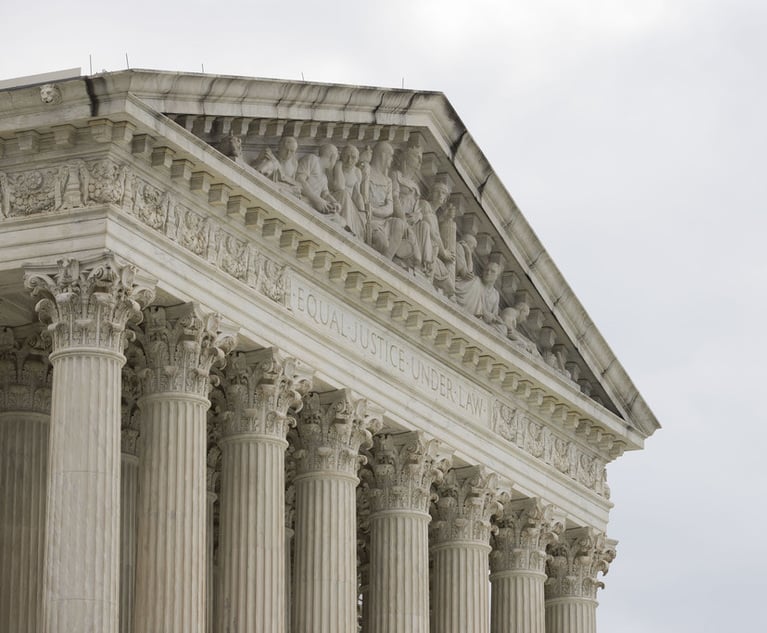New York’s Equal Rights Amendment Is a Big Deal
Among the positive far reaching consequences of the Equal Rights Amendment is a fix that makes New York's Bill of Rights self-executing, writes a former counsel to Gov. Mario Cuomo who was involved in talks to esatablish the terms of the amendment.
November 14, 2024 at 05:14 PM
4 minute read
The New York Equal Rights Amendment recently approved by voters is of greater consequence than many may realize. This is because its promoters tended not to emphasize its more far-reaching impact when seeking voter approval.
These far-reaching consequences it must be emphasized are not the negative outcomes warned against by opponents to the Amendment. For example, the protection against discrimination based on national origin will not give non-citizens the right to vote. The requirement that a voter be a citizen is specifically stated in a separate provision of the Constitution, and it is a basic rule of interpretation that a specific provision prevails over a more general statement.
Nor will student and senior discounts be ended as discrimination based on age. These discounts reasonably serve a legitimate purpose and will be sustained because those not receiving the discount have no civil right to a discount. The NYERA only covers discrimination in civil rights.
Also, where the inclusion of transgender girls in sports competition with biological girls would deprive the latter of a fair opportunity to compete, that would constitute an impairment of a civil right within the meaning of a provision of the NYERA which states “nor shall any characteristic listed in this section be interpreted to interfere with, limit, or deny the civil rights of any person based upon any other characteristic identified in this section.” Transgender girls cannot claim the benefit of this provision because they have no civil right to deprive others of an opportunity for fair sports competition.
So what then are the positive far-reaching consequences of the NYERA?
The Amendment fixes the problem arising from a court determination that the non-discrimination portion of Section 11 of the New York Bill of Rights is not self-executing. That meant that even when there was a clear violation of Section 11’s ban on public and private discrimination, no challenge could be brought. Instead, suits had to be commenced under civil rights laws. This was the outcome of the court’s determination that only the legislature could define the term “civil rights.”
By adding the words “pursuant to law,” as the NYERA does, Section 11 is now self-executing. That means that a challenge may be brought directly pursuant to Section 11. In assessing the validity of a law the courts will now have to decide whether it works any discrimination in the civil rights of a member of a protected group.
Given that Section 11 is now self-executing, Section 11’s ban on “any” discrimination is of great significance. There are two types of discrimination, intentional discrimination and disparate impact discrimination. Disparate impact discrimination occurs when a seemingly neutral law has an unreasonably disparate impact on members of a protected group. The New York and federal equal protection clauses bar only intentional governmental discrimination. Now for the first time, a law can be challenged by showing that it works an unreasonable disparate impact on protected persons.
This change is profound. Consider the example of the New York State budget. That budget is a law. Some of its provisions may create disparate impacts that are not reasonably justified. The suit can now be brought to enjoin expenditure under these provisions until the unreasonable disparate impact on a protected group is eliminated. Of course, injunctive relief can be delayed to allow a reasonable time for correction, but the day of reckoning would at some point arrive.
In making governmental discrimination pursuant to law challengeable on disparate impact grounds New York is leading the way to the next generation of constitutional protection of civil rights.
Evan Davis, a New York City lawyer, served as counsel to Gov. Mario Cuomo and is a past president of the New York City Bar Association. He participated substantially in discussions over the terms of the NYERA.
NOT FOR REPRINT
© 2024 ALM Global, LLC, All Rights Reserved. Request academic re-use from www.copyright.com. All other uses, submit a request to [email protected]. For more information visit Asset & Logo Licensing.
You Might Like
View All
Impact of New NYS Workers’ Compensation Work-Related Stress Relief on Discrimination Claims

Justices Will Weigh Constitutionality of Law Allowing Terror Victims to Sue PLO

Are New York City Housing Providers Ready for the Fair Chance for Housing Act?
10 minute read
Decision of the Day: Split Circuit Panel Bars Enforcement of Ivory Law's 'Display Restriction' on Antique Group Members
Trending Stories
- 1Call for Nominations: Elite Trial Lawyers 2025
- 2Senate Judiciary Dems Release Report on Supreme Court Ethics
- 3Senate Confirms Last 2 of Biden's California Judicial Nominees
- 4Morrison & Foerster Doles Out Year-End and Special Bonuses, Raises Base Compensation for Associates
- 5Tom Girardi to Surrender to Federal Authorities on Jan. 7
Who Got The Work
Michael G. Bongiorno, Andrew Scott Dulberg and Elizabeth E. Driscoll from Wilmer Cutler Pickering Hale and Dorr have stepped in to represent Symbotic Inc., an A.I.-enabled technology platform that focuses on increasing supply chain efficiency, and other defendants in a pending shareholder derivative lawsuit. The case, filed Oct. 2 in Massachusetts District Court by the Brown Law Firm on behalf of Stephen Austen, accuses certain officers and directors of misleading investors in regard to Symbotic's potential for margin growth by failing to disclose that the company was not equipped to timely deploy its systems or manage expenses through project delays. The case, assigned to U.S. District Judge Nathaniel M. Gorton, is 1:24-cv-12522, Austen v. Cohen et al.
Who Got The Work
Edmund Polubinski and Marie Killmond of Davis Polk & Wardwell have entered appearances for data platform software development company MongoDB and other defendants in a pending shareholder derivative lawsuit. The action, filed Oct. 7 in New York Southern District Court by the Brown Law Firm, accuses the company's directors and/or officers of falsely expressing confidence in the company’s restructuring of its sales incentive plan and downplaying the severity of decreases in its upfront commitments. The case is 1:24-cv-07594, Roy v. Ittycheria et al.
Who Got The Work
Amy O. Bruchs and Kurt F. Ellison of Michael Best & Friedrich have entered appearances for Epic Systems Corp. in a pending employment discrimination lawsuit. The suit was filed Sept. 7 in Wisconsin Western District Court by Levine Eisberner LLC and Siri & Glimstad on behalf of a project manager who claims that he was wrongfully terminated after applying for a religious exemption to the defendant's COVID-19 vaccine mandate. The case, assigned to U.S. Magistrate Judge Anita Marie Boor, is 3:24-cv-00630, Secker, Nathan v. Epic Systems Corporation.
Who Got The Work
David X. Sullivan, Thomas J. Finn and Gregory A. Hall from McCarter & English have entered appearances for Sunrun Installation Services in a pending civil rights lawsuit. The complaint was filed Sept. 4 in Connecticut District Court by attorney Robert M. Berke on behalf of former employee George Edward Steins, who was arrested and charged with employing an unregistered home improvement salesperson. The complaint alleges that had Sunrun informed the Connecticut Department of Consumer Protection that the plaintiff's employment had ended in 2017 and that he no longer held Sunrun's home improvement contractor license, he would not have been hit with charges, which were dismissed in May 2024. The case, assigned to U.S. District Judge Jeffrey A. Meyer, is 3:24-cv-01423, Steins v. Sunrun, Inc. et al.
Who Got The Work
Greenberg Traurig shareholder Joshua L. Raskin has entered an appearance for boohoo.com UK Ltd. in a pending patent infringement lawsuit. The suit, filed Sept. 3 in Texas Eastern District Court by Rozier Hardt McDonough on behalf of Alto Dynamics, asserts five patents related to an online shopping platform. The case, assigned to U.S. District Judge Rodney Gilstrap, is 2:24-cv-00719, Alto Dynamics, LLC v. boohoo.com UK Limited.
Featured Firms
Law Offices of Gary Martin Hays & Associates, P.C.
(470) 294-1674
Law Offices of Mark E. Salomone
(857) 444-6468
Smith & Hassler
(713) 739-1250






